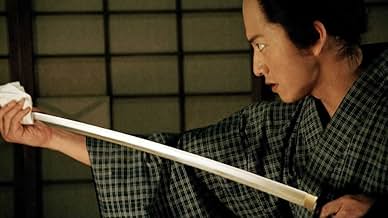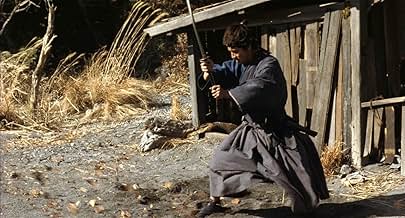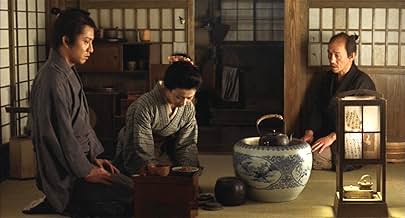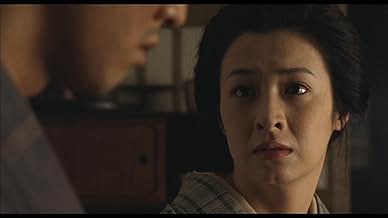VALUTAZIONE IMDb
7,7/10
4489
LA TUA VALUTAZIONE
Aggiungi una trama nella tua linguaA look at the relationship between a young blind samurai (Kimura) and his wife, who will make a sacrifice in order to defend her husband's honor.A look at the relationship between a young blind samurai (Kimura) and his wife, who will make a sacrifice in order to defend her husband's honor.A look at the relationship between a young blind samurai (Kimura) and his wife, who will make a sacrifice in order to defend her husband's honor.
- Regia
- Sceneggiatura
- Star
- Premi
- 15 vittorie e 16 candidature totali
Z. Charles Bolton
- Man B
- (English version)
- (voce)
Duncan Brannan
- Hori
- (English version)
- (voce)
- …
Cole Brown
- Sensei
- (English version)
- (voce)
Chris Burnett
- Shinsuke
- (English version)
- (voce)
Colleen Clinkenbeard
- Kayo Mimura
- (English version)
- (voce)
Recensioni in evidenza
This is a really good film. Slow paced, just like real life in the Edo jidai. A good story, excellent acting and it gives good insight to the daily life of a low level samurai. There's a great atmosphere with not flashy but realistic scenery.
If you are looking for lots of action and swordplay, this isn't for you. But I found this film strangely moving and quite beautifully arranged.
Well worth seeing.
If you are looking for lots of action and swordplay, this isn't for you. But I found this film strangely moving and quite beautifully arranged.
Well worth seeing.
Yoji Yamada's appropriately dubbed 'Love and Honor' is a samurai's story of just that; Takuya Kimura is Mimura, a samurai who is used to test food for poisoning by eating it in order to prevent the lord of his clan from being poisoned. Mimura becomes blind after being fed an off-season food that can become poisonous if not prepared properly. Unable to provide for himself, Mimura becomes suicidal. His loving wife Kayo declares her support for him, offering to follow him into death. Mimura is convinced to continue on living, but with Mimura unable to provide for he and his family, his wife is left to find a way to support them. In this classic tale of love and honor, follow a blind man's struggles to find peace of mind as he tries to follow his samurai code.
Both the setting of the theme and the creation of the emotional atmosphere tend to make the film more romantic. And exquisite detail guarantees the reliability that a drama about ancient Japan should have. Although the film mainly focuses on the daily life of a samurai, the director Yôji Yamada still gave a little bit of chivalric romance to the ending. However, there is no coexistence between the everyday life and the spirit of a samurai.
Therefore, the protagonist's choice finally writes a summary for this passing era.
Others have commented on the story so I will skip the synopsis.
The story is about human drama, and the unusual talent the main character has that leads to bombastic climax. This is typical Shuhei Fujisawa's style, and this story is no exception.
What took away from the story compared to other Shuhei Fujisawa based movie is the poor acting by Takuya Kimura. His impatient and jittery personality shows in his acting, and the poor ways he speaks the dialog all takes away from the proper mood of the story. As the member of SMAP - a Japanese idol group, his acting DNA was bread for more modern situation, and probably isn't a good match for a period drama like this one. I couldn't get the feeling that this was a samurai living several hundred years ago. His poor dialog skill also was evident in more recent movie Uchuu Senkan Yamato as well. Another period piece starring his SMAP colleague Shingo Katori's "Zatoichi The Final" was also a flop, attesting to the mismatch of SMAP member with samurai movies.
So the main focus was weak, but the movie still has quality all its own. The sword fight scene was superb like other Fujisawa novel based movies. As a samurai movie, this is still one of the best in recent years, and is recommended along with other Shuhei Fujisawa movies such as Hisshiken Torizashi, and Hana no Ato.
The story is about human drama, and the unusual talent the main character has that leads to bombastic climax. This is typical Shuhei Fujisawa's style, and this story is no exception.
What took away from the story compared to other Shuhei Fujisawa based movie is the poor acting by Takuya Kimura. His impatient and jittery personality shows in his acting, and the poor ways he speaks the dialog all takes away from the proper mood of the story. As the member of SMAP - a Japanese idol group, his acting DNA was bread for more modern situation, and probably isn't a good match for a period drama like this one. I couldn't get the feeling that this was a samurai living several hundred years ago. His poor dialog skill also was evident in more recent movie Uchuu Senkan Yamato as well. Another period piece starring his SMAP colleague Shingo Katori's "Zatoichi The Final" was also a flop, attesting to the mismatch of SMAP member with samurai movies.
So the main focus was weak, but the movie still has quality all its own. The sword fight scene was superb like other Fujisawa novel based movies. As a samurai movie, this is still one of the best in recent years, and is recommended along with other Shuhei Fujisawa movies such as Hisshiken Torizashi, and Hana no Ato.
A young samurai, married to a beautiful woman, accidentally becomes blind for life. This is the intimate story of what happens to this couple in mid-nineteenth-century Japan. Finding personal honor, love for oneself and for the woman one loves, finding a purpose for living. Director Yamada tells us this with an increasingly engaging and intimate narrative style. In my opinion very refined in the feelings it wants to convey, accurate in the scenic reconstructions of daily life of the time. Worth seeing if you liked, also by Yamada, Twilight of the Samurai (2002) even if it does not reach the depths of story, feelings and direction.
Lo sapevi?
- QuizIn the film it is mentioned repeatedly that the main character of Shinnojo Miura receives a yearly stipend of 30 koku. During the Edo period of Japan a koku was a unit of measure that had the equivalent of one year's worth of rice for a person (approx. 150 kg). For a samurai 30 koku was a small salary and Shinnojo was thus of a low level. Incidentally, the title character from another of Yôji Yamada's films Il crepuscolo del samurai (2002) also receives a 30 koku stipend after having 20 koku deducted from his 50 koku salary to pay for his recently deceased wife's funeral.
- BlooperIt is not stated why, when blinded, he could not continue with his food tasting role, for which sight is not required.
- Citazioni
Shinnojo Mimura: Be resolved you will both die. In that lies victory. Life lies in resolve for death.
- ConnessioniFollows Il crepuscolo del samurai (2002)
I più visti
Accedi per valutare e creare un elenco di titoli salvati per ottenere consigli personalizzati
- How long is Love and Honor?Powered by Alexa
Dettagli
- Data di uscita
- Paese di origine
- Sito ufficiale
- Lingua
- Celebre anche come
- Love and Honor
- Luoghi delle riprese
- Aziende produttrici
- Vedi altri crediti dell’azienda su IMDbPro
Botteghino
- Lordo Stati Uniti e Canada
- 60.910 USD
- Fine settimana di apertura Stati Uniti e Canada
- 5234 USD
- 4 mag 2008
- Lordo in tutto il mondo
- 33.755.574 USD
- Tempo di esecuzione
- 2h 2min(122 min)
- Colore
- Mix di suoni
- Proporzioni
- 1.85 : 1
Contribuisci a questa pagina
Suggerisci una modifica o aggiungi i contenuti mancanti


























